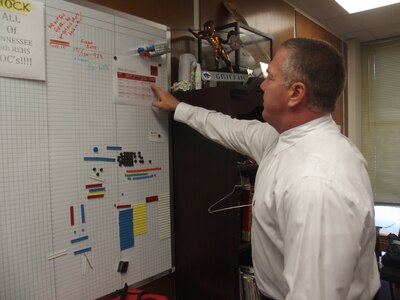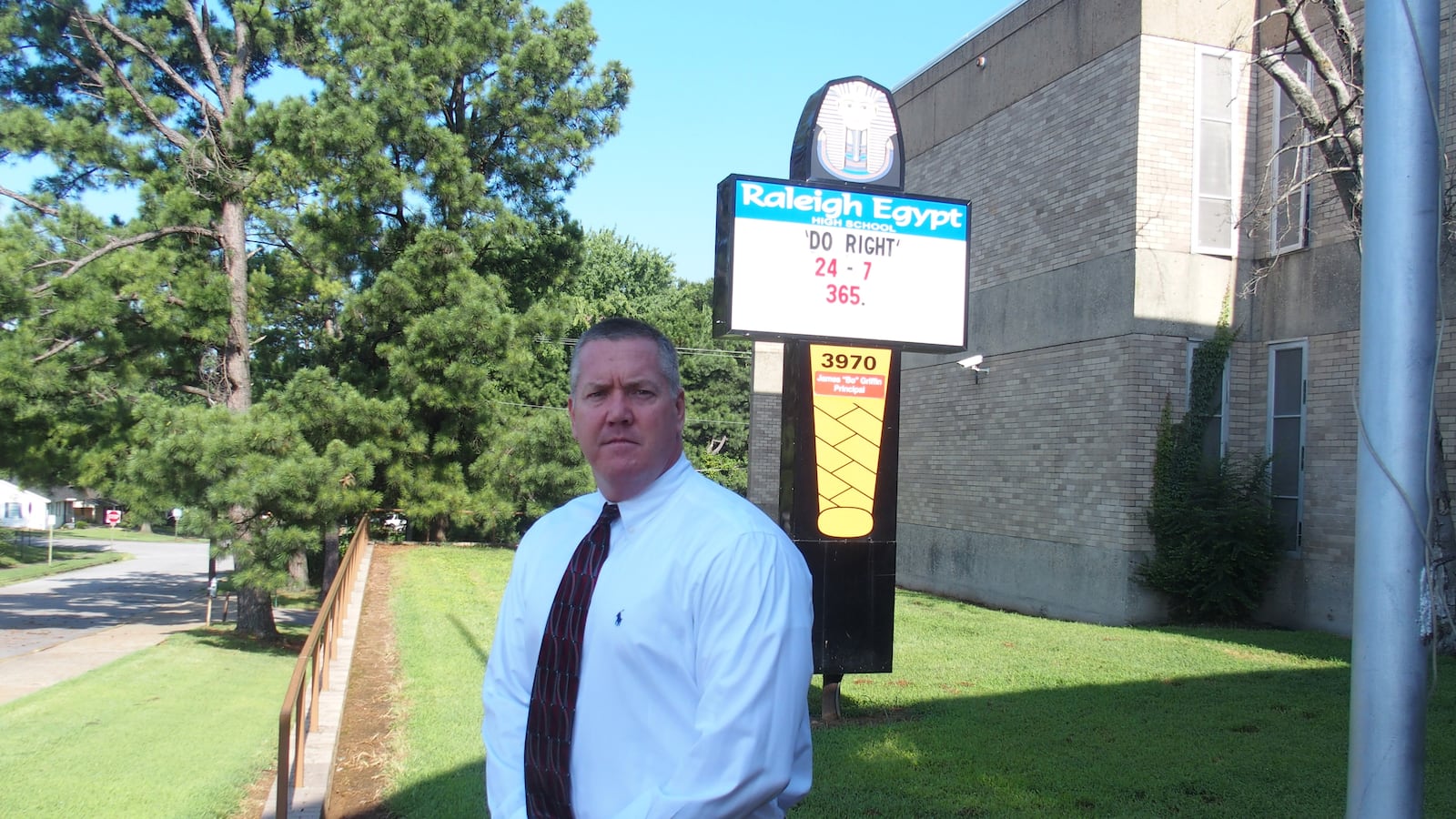Late last fall, James “Bo” Griffin, the principal of Raleigh-Egypt High School, sat his staff down in the faculty lounge of the school’s cinderblock building for a sobering meeting. While a charter operator had declined the state’s invitation to overhaul the Memphis school, the threat of takeover still loomed. Just one of the school’s 170 seniors had passed the state’s English exam, and only half of its seniors graduated.
“The problem with Raleigh-Egypt is sitting in this room,” Griffin told the teachers. “So is the solution.”
Over the next year, Griffin and his staff strictly enforced Raleigh-Egypt’s code of conduct, brought in a literacy coach to work with English teachers, and rebuilt the sports powerhouse’s school pride.
On Wednesday, Griffin hosted district leaders at Raleigh-Egypt to celebrate this year’s scores. By boosting the number of students passing state tests — 31 had passed the English III exam — the school had made some of the biggest gains in Shelby County Schools. And in doing so, it had escaped intervention by the Achievement School District for a second year, at least for now.
Of the 19 district schools that were so low-performing that they were eligible to be absorbed by the state-run district, 11 more saw test score gains large enough to stop that from happening this year — even as all of them, like Raleigh-Egypt, remain far from being high-scoring schools.
That leaves just seven Memphis schools eligible to be absorbed by the ASD — a move that usually causes schools to have their names, teachers, principals and programs changed. ASD officials have said they plan to take on six new schools for 2016.
Shelby County Schools Superintendent Dorsey Hopson has said that the mere threat of being absorbed by the state district has whipped schools across the city into shape. Principals are observing more classrooms, teachers are spending more time on their lesson plans, and students are showing up to class more than ever, he told Chalkbeat.
“The ASD has created this sense of urgency that may not of been there,” Hopson said. “Principals, if they never knew before, you now see them with an extra pep in their step. You see communities rallying around schools.”
Griffin, a former baseball coach and CrossFit enthusiast who works out in his basement at 4:30 a.m. daily, says he likes competition. But he gives the ASD — which has drawn fierce opposition from the schools it has tried to absorb — little credit for Raleigh-Egypt’s improvement.
“I don’t want the ASD to get one ounce of credit for what’s happened at this school,” he said on a recent morning while preparing for the school year, which starts in two weeks. “I had a spring in my step before they tried to take over this school.”
Pointing to the fact that the state had given the school the lowest possible rating for how much it helped students to advance in 2014, the ASD announced last fall that it would take over Raleigh-Egypt and assign operations to Green Dot Public Schools, a California charter network.
Hopson had just hired Griffin, a fast-talking Arkansan with a strong reputation in local schools, to turn Raleigh-Egypt around. And Griffin quickly had won over many in Raleigh, a down-on-its-luck community on the east side of Memphis.
Griffin immediately set to work. Along with his assistant principals, he drove around the surrounding neighborhoods of bungalow homes — many foreclosed on — knocking on doors and reminding parents and students that school was getting ready to start.
The school community grew closer yet because of a trauma near the beginning of the year. Duane Stokes, a longtime basketball coach, died at the school after suffering a heart attack. Griffin attempted to save him by performing CPR.
In an unusual move, Hopson said publicly that he told ASD officials not to take over Raleigh-Egypt because of the “synergy” he observed among Griffin and the principals of the community’s elementary and middle schools. The new leadership would bring changes to the long-struggling schools that many in Raleigh call “the tomb of doom,” Hopson said.

After a contentious community meeting and several private conversations between officials and community leaders, Green Dot decided not to step in.
“We don’t want to create a hostile environment where kids are in the middle of this,” said Megan Quaile, executive director of Tennessee’ s Green Dot Public Schools, at the time. “They’ve asked us to give them some time, and we’re going to honor their request.”
But in a robocall to parents, the ASD warned that if the school failed to make improvement, it still could be overhauled in the future.
At the time, Griffin called the situation an “opportunity” and “fuel for us to work even harder to hit our numbers.”
On Wednesday, teachers described substantial changes that took place over the course of the year.
For starters, the school began cracking down on student misconduct. If a student was seen wandering the hallways during class, Assistant Principal Jacqueline Lang would ask them where they were supposed to be, something that didn’t always happen in the past.
Bigger changes took place in classrooms. Every student was given an individual plan for improving their English skills, and many were required to attend tutoring sessions on Saturdays.
With the help of central office staff, principals at the three neighborhood schools began collaborating on intervention strategies, meeting weekly and emailing each other daily. High school students took regular trips to the elementary school to tutor.
“We had to give students buy-in like they owned it. When they owned it, that’s when you start seeing the fives start showing up,” said Hope White-Lane, the school’s literacy coach, referring to the state’s highest score for student growth.
Students repainted the dim hallways with pictures of pharaohs and pyramids, and a sense of pride began to seep back into the school, said Sarah Robinson, 17, a rising senior.
“They pushed us really hard and told us you can do it,” she said. “There were a lot of new changes.”
While it made gains, the school still has a long way to go. Thirty-one seniors passed the English III exam last year, a 17 percentage point jump over the previous year. But 195 did not. They instead posted scores suggesting that they do not have the literacy skills needed to succeed after graduation. And only 139 of 226 seniors graduated, although Griffin said almost all of the seniors who did not graduate came to school rarely if at all.
For now, Griffin said he is optimistic about Raleigh-Egypt’s future.
“The main thing for us is we want to take care of our kids,” he said. “We’re here to serve the children of Raleigh.”

